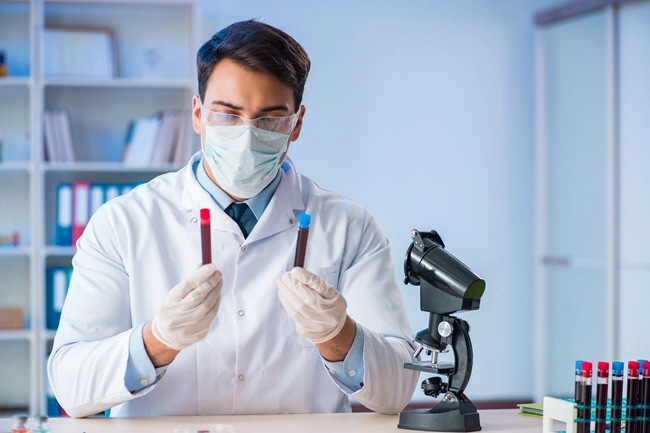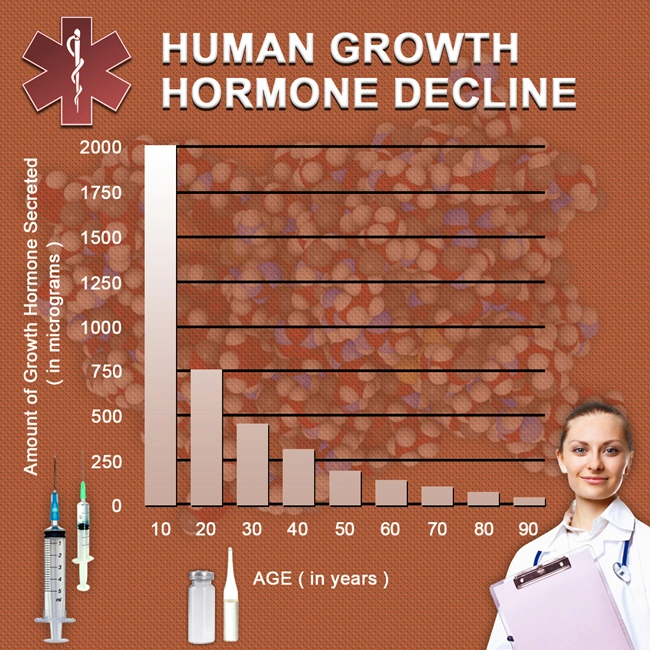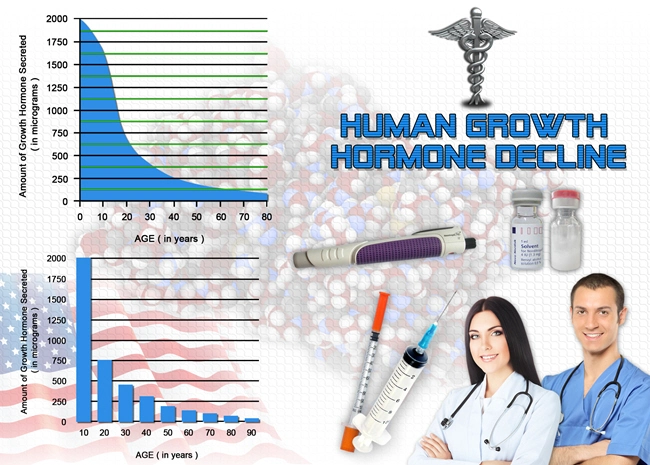
 One of the lesser-known benefits of Human Growth Hormone (HGH) Replacement Therapy is its invigorating effect on the skin. Growth hormone can strengthen collagen, which helps erase wrinkles and produce a healthy glow and tone to your face.
One of the lesser-known benefits of Human Growth Hormone (HGH) Replacement Therapy is its invigorating effect on the skin. Growth hormone can strengthen collagen, which helps erase wrinkles and produce a healthy glow and tone to your face.
More good news: in addition to HGH there are many other steps you can take to turn the clock back on the damage that aging has inflicted. Let's discuss a few of them.
When it comes to healthy, glowing skin, the first thing that most people think of is what they can put on their skin directly.
Moisturizers, in the form of sprays, creams, and gels, promise to deliver a more youthful, radiant look, and they're right.
Many topical products can work wonders to restore your skin to the look you desire. However, that is only half the battle. Never forget that...
Video Link: https://vimeo.com/252591160
Video Download: Click Here To Download Video
Video Stream: Click Here To Stream Video
Healthy Skin begins from the Inside Out
That's right. There is an ancient cliché that “you are what you eat,” and that applies to your skin as well. The good news: you can battle back against the effects of aging with each meal you eat, and it's not complicated!
Let's take a brief look at why nutrition is important.
Inflammation: The Enemy of your Skin
When you eat unhealthy foods, the result is that your body produces chemicals that cause inflammation 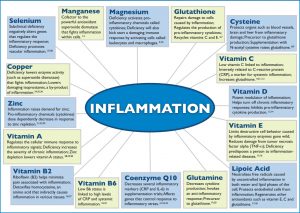 . Inflammation is defined as “the body's attempt at self-protection; the aim being to remove harmful stimuli, including damaged cells, irritants, or pathogens -- and begin the healing process.”
. Inflammation is defined as “the body's attempt at self-protection; the aim being to remove harmful stimuli, including damaged cells, irritants, or pathogens -- and begin the healing process.”
Inflammation is our body's defense against harmful invaders (i.e., toxins, viruses, etc.) and serves a useful role. However, there can be too much of a good thing. When inflammation is triggered too often, problems arise.
A good example is your air conditioner.
When used correctly, it provides a comfortable atmosphere. But if it stays on all the time, things will be uncomfortable, to say the least.
Inflammation has been linked to a broad range of health problems: heart disease, Alzheimer's, cancer...and aged, dry, wrinkled skin.
Inflammation needs to be controlled, and the best way to do that is by eating the right foods. Here are a few food recommendations that, when eaten consistently, can make a huge difference in the health of your skin:
- Salmon. Salmon is jammed-packed with essential fatty acids such as Omega-3's, which dramatically reduce
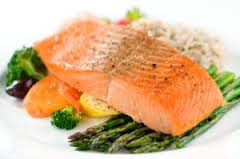 inflammation. This is because they target a harmful chemical called leukotriene-B-4 (LTB4), which is made in your cells from unhealthy fats. Salmon is also ideal for combatting dry skin.
inflammation. This is because they target a harmful chemical called leukotriene-B-4 (LTB4), which is made in your cells from unhealthy fats. Salmon is also ideal for combatting dry skin. - Spinach. While just about any brightly colored fruit or vegetable is great for your skin, spinach is super beneficial. Spinach is incredibly rich in anti-oxidants such as vitamin A and beta-carotene, as well as omega-3 fatty acids. Together, these two nutrients team up to keep your skin healthy.
- Broccoli. Broccoli contains a substance called sulforaphane, which is very efficient in repairing skin damage. Also, just like spinach, broccoli delivers a load of anti-oxidants.
- Yogurt. Dairy protein can firm up your skin, making it harder for wrinkles to set in. Yogurt in general and Greek yogurt, in particular, is particularly useful since Greek yogurt has approximately double the protein content of regular yogurt. As a bonus, Yogurt contains zinc, which is an essential ally in the war against wrinkles.
- Berries. Berries in general, and strawberries, in particular, are loaded with vitamin C. Research has shown that people who eat foods with a high vitamin C
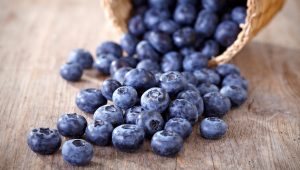 content suffer from fewer wrinkles than those who don't eat high vitamin C foods. Why? Because vitamin C destroys free radicals, which are hideous substances that attack our cells and wear down our collagen.
content suffer from fewer wrinkles than those who don't eat high vitamin C foods. Why? Because vitamin C destroys free radicals, which are hideous substances that attack our cells and wear down our collagen.
In addition to food, there are several nutritional supplements that you can recruit to help you in your battle to keep your cells in good health, your skin youthful, and your body in excellent health.
Here are a few recommendations...
- Vitamin A. This vitamin is so useful for the skin that it is prescribed (as Accutane or Retin-A) to heal acne and other skin problems. One caveat: Do not overload your system with vitamin A. It is a fat-soluble vitamin, which means it can store up in your body and possibly become toxic. Limit your daily intake to 5,000 IU, or take its precursor, beta-carotene, which converts to vitamin A inside the body and does not become toxic.
- B-complex. There are several different vitamins in this all-important complex, and each one is vital since they all make various contributions to your health and skin. B vitamins provide essential enzymes for the cellular processes that produce energy in your skin's cells.
- Remember, B's are water-soluble, and therefore need to be continuously replenished. To benefit most from B vitamins, take a supplement that combines them as B-complex. This way, you will get an even amount of each essential nutrient in the group.
- Vitamin C. This miraculous vitamin fights the most prolific producer of aging damage: free radicals. Free radicals are atoms or groups of atoms with an
 odd (unpaired) number of electrons and can be formed when oxygen interacts with specific molecules.
odd (unpaired) number of electrons and can be formed when oxygen interacts with specific molecules. - Once built these highly reactive radicals can start a chain reaction, like dominoes. Their chief danger comes from the damage they can do when they react with essential cellular components such as DNA, or the cell membrane. Cells may function poorly or die if this occurs...with disastrous results to your skin and overall appearance.
- Vitamin C also produces collagen, which is a protein that gives your skin its strength and elasticity. Like B vitamins, vitamin C is water-soluble, and also needs to be replenished daily. You should take a minimum of 1,000 grams daily, and more if you are older. If you are in the 50 or older age group, a daily intake of 3,000 to 5,000 grams daily could be considered. But work up to that level gradually, since too much too quickly could result in digestive issues.
- Vitamin E. Want proof that vitamin E works wonders for your skin? Just read the labels on most night creams and moisturizers. Almost all of them
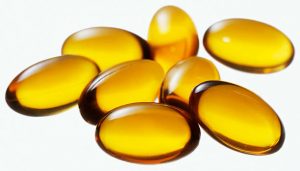 contain at least a small amount of vitamin E, and some contain large quantities. If you are young, 200 IU daily should do the trick. If you are in your forties or fifties, aim for 400-800 IU daily.
contain at least a small amount of vitamin E, and some contain large quantities. If you are young, 200 IU daily should do the trick. If you are in your forties or fifties, aim for 400-800 IU daily. - One caution: make sure your vitamin E is comprised of both tocotrienols and gamma-tocopherol. Why? Because both of these forms of E have been proven to be the most useful in the never-ending battle against the ravages of free radicals.
- Calcium. Calcium works with magnesium to keep your bones, teeth, and skin healthy. No need to overdo it; 1,000 milligrams daily are fine; anything more may wreak havoc on your digestive system.
- Magnesium. This mineral performs a wide array of functions. Four hundred milligrams daily is a reasonable dose.
- Zinc. Zinc is paramount for glowing, healthy skin since it is a member of a group of enzymes that help your body maintain its all-important collagen supply. Without sufficient amounts of zinc, the proteins that sweep away damaged collagen have trouble functioning.
- Zinc also attacks the continual scourge of free radicals. Caution: zinc can be toxic in large doses. 15 to 30 milligrams a day is recommended.
- Alpha-lipoic acid. This all-star anti-oxidant is 400 times stronger than vitamins C and E and also raises the level of these two vitamins inside the body. Alpha-lipoic acid also helps the skin in another way. When taken orally (and used topically), it prevents the sugar damage of protein, which inhibits the attachment of sugars to collagen. The result? Less premature aging and damage to your skin.
- Coenzyme Q 10. This potent, great substance penetrates the cell membrane of the skin, protecting it from free radical damage.
- L-Glutamine. This amino acid is a precursor of glutathione, which many researchers consider the “master antioxidant.” This benefits your health in many
 ways, including your skin.
ways, including your skin. - Omega6-Omega3 EFA's. Both of these oils team up to fight inflammation, which damages your skin. Take them in a two-to-one ratio, which means double the amount of omega-3 compared to omega-6.
- Acetyl-L-carnitine. If you are over age 50 and attempting to repair the accumulated damage to your skin, you need this supplement. Acetyl-L-carnitine helps to repair mitochondria, which is the energy-producing part of your cells. More energy = more ability to fight aging...including aging damage to your skin. 500 to 1,500 milligrams a day will make a huge difference.
- Pycnogenol. This protects your skin by protecting your collagen. 50 to 100 milligrams daily will keep your skin glowing.
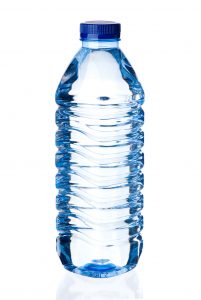 Also, don't forget the importance of water. Staying hydrated is so important since your body needs sufficient amounts of water to perform the metabolic processes to not only keep you alive but keep your skin looking bright, radiant, and glowing.
Also, don't forget the importance of water. Staying hydrated is so important since your body needs sufficient amounts of water to perform the metabolic processes to not only keep you alive but keep your skin looking bright, radiant, and glowing.
Following these simple recommendations will make a gigantic difference, in both your overall health...and the appearance of your skin.
Contact us for a FREE, no-obligation discussion of the many benefits of growth hormone replacement therapy, and that includes glowing, healthy, and radiant skin tone!
References
The Best Supplements For Glowing Skin — A Dermatologist Explains
Nutrients for Healthy Skin: Inside and Out
Contact Us Today For A Free Consultation
Dear Patient,
Once you have completing the above contact form, for security purposes and confirmation, please confirm your information by calling us.
Please call now: 1-800-380-5339.
Welcoming You To Our Clinic, Professor Tom Henderson.

- Are You Constantly Feeling Tired And Fatigued ? [Last Updated On: April 27th, 2025] [Originally Added On: May 1st, 2018]
- Constantly Tired? Can't Sleep? [Last Updated On: March 14th, 2025] [Originally Added On: March 23rd, 2019]
- How to Understand and Deal with Cirrhosis [Last Updated On: March 13th, 2025] [Originally Added On: April 12th, 2019]
- Insomnia: The Silent Killer [Last Updated On: March 12th, 2025] [Originally Added On: April 30th, 2019]
- Lipocine Reintroduces Tlando [Last Updated On: August 19th, 2025] [Originally Added On: March 18th, 2020]
- High-Intensity Interval Training Boosts Both Body and Mind [Last Updated On: February 20th, 2025] [Originally Added On: May 10th, 2020]
- Tattoo Safety: What to Know Before You Get a Tattoo [Last Updated On: February 28th, 2025] [Originally Added On: June 2nd, 2020]
- Testosterone and Fatherhood [Last Updated On: April 25th, 2025] [Originally Added On: October 12th, 2020]
- L-Arginine: The Key to Both Heart Health and Sexual Health [Last Updated On: March 10th, 2025] [Originally Added On: December 4th, 2020]
- The Importance of Hormonal Balance for Menopause [Last Updated On: February 20th, 2025] [Originally Added On: December 14th, 2020]
- Menopause Drugs: Study Stokes New Debate Over Cancer Risks [Last Updated On: March 8th, 2025] [Originally Added On: December 16th, 2020]
- Study Examines Link Between Growth Hormones and Osteoporosis [Last Updated On: March 11th, 2025] [Originally Added On: December 17th, 2020]
- Everything You Need to Know About Clomiphene [Last Updated On: March 9th, 2025] [Originally Added On: December 20th, 2020]
- Fast Facts About DHEA: What You Need to Know About This Natural Steroid [Last Updated On: August 16th, 2025] [Originally Added On: March 4th, 2021]
- Enjoy a Few Drinks Weekly? Beware: This May Be a Link to Low Sperm Counts and Quality [Last Updated On: March 6th, 2025] [Originally Added On: August 16th, 2021]
- Hormone Therapy May Benefit Some Women's Hearts [Last Updated On: February 20th, 2025] [Originally Added On: August 18th, 2021]
- HGH Male Blood Panel [Last Updated On: October 28th, 2021] [Originally Added On: September 28th, 2021]
- Growth Hormone Battles Osteoporosis [Last Updated On: February 26th, 2025] [Originally Added On: October 11th, 2021]
- Growth hormone = More Sleep = Better Sex! [Last Updated On: March 7th, 2025] [Originally Added On: October 11th, 2021]
- Low Testosterone and Hypogonadism: The Difference [Last Updated On: May 19th, 2025] [Originally Added On: October 12th, 2021]
- The Link Between Testosterone and Tylenol [Last Updated On: February 21st, 2025] [Originally Added On: October 12th, 2021]
- Hormone Replacement Therapy and Aerobics May Ease Menopause Symptoms [Last Updated On: February 19th, 2025] [Originally Added On: October 13th, 2021]
- Growth Hormone and Lifestyle = An Extended Lifespan [Last Updated On: February 23rd, 2025] [Originally Added On: October 13th, 2021]
- Hormone Replacement Therapy, Menopause, and Cancer [Last Updated On: February 24th, 2025] [Originally Added On: October 13th, 2021]
- Growth Hormone, Exercise, and Osteoporosis: The Facts! [Last Updated On: February 22nd, 2025] [Originally Added On: October 13th, 2021]
- Hormone Replacement Therapy and Menopause [Last Updated On: February 25th, 2025] [Originally Added On: October 13th, 2021]
- Testosterone and Women [Last Updated On: February 18th, 2025] [Originally Added On: October 13th, 2021]
- Growth Hormone and Smoking [Last Updated On: February 19th, 2025] [Originally Added On: October 14th, 2021]
- Testosterone, Statins, and Prostate Cancer [Last Updated On: February 18th, 2025] [Originally Added On: October 19th, 2021]
- Researchers Investigate Declining Sperm Counts, Find Chemicals Rampant [Last Updated On: May 23rd, 2025] [Originally Added On: June 14th, 2022]
- Understanding the Role of Hormonal Balance in Menopause [Last Updated On: February 7th, 2025] [Originally Added On: February 7th, 2025]
- Introduction: Benefits of Hormone Replacement Therapy [Last Updated On: February 8th, 2025] [Originally Added On: February 8th, 2025]
- The Influences and Benefits of High-Intensity Interval Training [Last Updated On: February 8th, 2025] [Originally Added On: February 8th, 2025]
- The Link Between Human Growth Hormone, Exercise, and Osteoporosis [Last Updated On: February 9th, 2025] [Originally Added On: February 9th, 2025]
- The Therapeutic Benefits of Human Growth Hormone [Last Updated On: February 16th, 2025] [Originally Added On: February 16th, 2025]
- Introduction: The Reality of Menopause [Last Updated On: February 18th, 2025] [Originally Added On: February 18th, 2025]
- An Introduction to the Benefits of Human Growth Hormone Replacement Therapy [Last Updated On: February 19th, 2025] [Originally Added On: February 19th, 2025]
- Introduction to Hormone Replacement Therapy [Last Updated On: February 20th, 2025] [Originally Added On: February 20th, 2025]
- Introduction: Evaluating the Safety of Hormone Replacement Therapy [Last Updated On: February 23rd, 2025] [Originally Added On: February 23rd, 2025]
- The Rise of Tattoos in America [Last Updated On: February 23rd, 2025] [Originally Added On: February 23rd, 2025]
- The Influence of Growth Hormone and Sleep on Libido [Last Updated On: February 27th, 2025] [Originally Added On: February 27th, 2025]
- Introduction: The Association Between Alcohol Consumption and Sperm Quality [Last Updated On: February 27th, 2025] [Originally Added On: February 27th, 2025]
